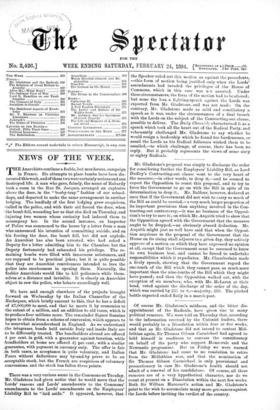Mr. Gladstone's proposal was simply to discharge the order for
considering further the Employers' Liability Bill, as Lord Dudley's Contracting-out clause went to the very heart of the measure,—in other words, to drop it,—and he seemed to expect the Opposition to resist this proposal, and to try to force the Government to go on with the Bill in spite of its determination to drop it.. Mr. Balfour, however, declared at once that if the Government did not wish to carry so much of the Bill as could be carried,— a very much larger proportion of its important provisions than anything involved in the Con- tracting-out controversy,—it was no business of the Opposi- tion's to try to save it; on which Mr. Asquith tried to show that the Opposition agreed with the Government that the measure ought to be dropped,—an obviously absurd deduction. Mr. Asquith might just as well have said that when the Opposi- tion acquiesce in the proposal of the Government that the House on its rising shall adjourn to a given day, they actively approve of a motion on which they have expressed no opinion at all, except that the Government must be assumed to know its own business best, and cannot be forced to undertake responsibilities which it repudiates. Mr. Chamberlain made a lively speech, showing that the Government regard the one-tenth of the Bill which they cannot pass, as much more important than the nine-tenths of the Bill which they might have passed ; and then the Opposition walked out, with the exception of six members, who, with Mr. McLaren at their head, voted against the discharge of the order of the day, which was carried by 225 to 6,—majority, 219. The pitched battle expected ended flatly in a march-past.


































